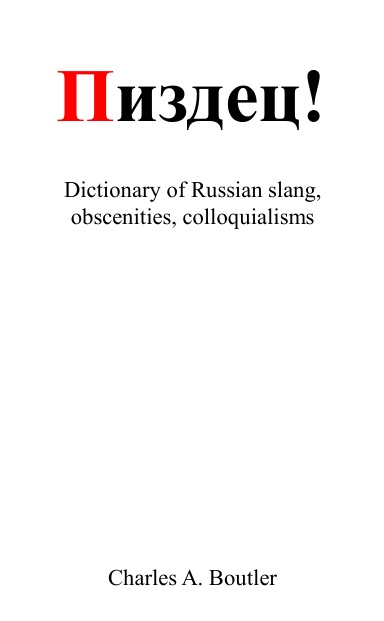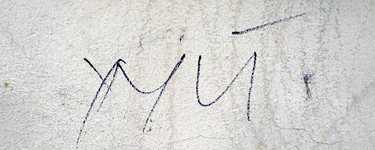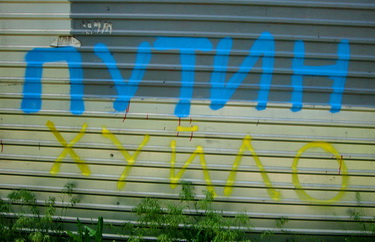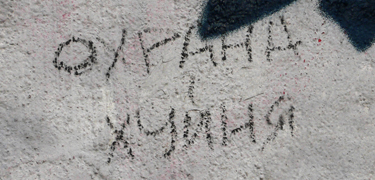1. Cock, dick, prick — in short a strong word for the penis, that you should be cautious not to repeat in public.
Я так люблю, когда большой,
Когда большой и толстый хуй во мне.
Я так хочу, чтоб он был твой,
Но твой большой — он только в моем сне.
(Ленинград, Сладкий сон, 2011)
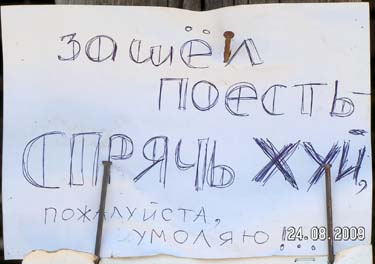
Зашел поесть — спрячь хуй, пожалуйста, умоляю
(“Came in for lunch? Please hide your dick, I’m begging you”),
warning in a Crimean eatery at a nudist beach (Aug. 2009), © Фёдорыч
2. Pejorative synecdoche for a man in general.
В круг вошел, взмахнул рукой.
— Ты откуда, хуй такой?
3. Idiot, moron.
4. Almost every remotely phallus-shaped thing.
5. This word is so widely used, that it can have almost any meaning, depending on the context.
The etymology of хуй is Slavic and stems from a Slavonic root that has also given the words хвоя (“needle, branches of conifers”) and хвост (“tail”) according to Max Vasmer. The term хуй or chuj has the same meaning in Ukrainian, Bulgarian, Polish, Czech and Slovak as in Russian; the first written occurrence in Russia are to be found on old Novgorodian birch bark documents, and pre-date the Mongol invasion. Therefore the popular etymologies claiming the word is of Tatar origin can safely be disregarded as an attempt to blame foreigners for the perceived vulgarity of one aspect of Russian language. This of course also applies to the ludicrous Latin etymology suggested by some (deriving the word from huic). The sound of this word is deemed so obscene that a young man brandishing a poster with a mixed Russian-Ukrainian text Путин пiдрахуй оставшиеся свободы дни! (“Putin ccount your days of freedom!”, where підрахуй is Ukrainian for Russian считай) was jailed for a day in May 2013.
Note that the usual English transcription (not the scientific one used in this document) is “huy”, which explains why the town Huy (province Liège) is an endless source of amusement for dirty minded Russian speakers (the Flemish name of the town, Hoei, is pronounced just like the Russian three letters word). Following Chinese symbols also prompt a smile from Russians: 茴, 蛔, 彗, 诙, 隳, 洄, 虺, 恚, 缋, 蕙, 蟪, 喙, 灰, 回, 讳, 恢, 晦, 烩, 辉, 麾, 悔, 贿, 秽, 慧, 徽, 毁, 绘, 卉, 晖, 汇, 诲, 挥, 惠, 会, 荟. They are all pronounced hui (huī, huí, huǐ, huì) and mean, amongst other, beak, grey, ash, to turn, taboo, vast, dark, cooked, to shine, banner, bribe, dirty, wise, symbol, to destroy, to paint, herbs, sunlight, to converge, to teach, to direct, meeting. The Vietnamese verb meaning to mobilise also bears a bilingual humorous potential: huy động; while the verb hủy means to destroy.
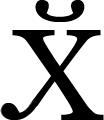
The хуй monogram
Synonyms: болт, буй, вафля, голый Вася, градусник, елдык, кляп, колбасина, конец, косточка, писька, палка, плешь, сарделька, три буквы, фига, фуй, хвост, хер, хрен, ху-ху, член, шампур, шиш, шмайсер, щекотун, эклер.
Derived terms: дохуя, захуярить, захуячить, нахуя, нахуярить, нахуяриться, нахуячиться, нехуёво, нехуй, хуёвый, отхуяривать, отхуярить, охуевший, охуенный, охуеть, охуивать, охуительно, охуительный, похуист, похуй, расхуярить, хуеватый, хуеверть, хуёвина, хуёвина, хуёво, хуегрыз, хуеплёт, хуесос, хуета, хуетень, хуетень, хуипан, хуище, хуйло, хуйнуть, хуйня, хули, хули, хуякнуть, хуякнуться, хуярить, хуячить.

